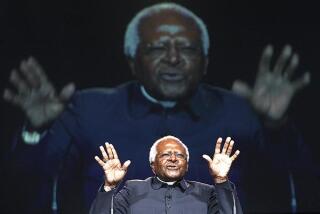SOUTH AFRICA : New Scandal May Keep Boesak Out of U.N. Post
- Share via
JOHANNESBURG, South Africa — Back when challenging apartheid was political apostasy, not to mention illegal, a charismatic Cape Town minister in the Dutch Reformed Mission Church won international fame by leading the charge to have apartheid declared a religious heresy.
The Rev. Allan Boesak soon was named president of the World Alliance of Reformed Churches. He was second only to Desmond Tutu, Nobel laureate and archbishop of Cape Town, as an impassioned voice of morality and reason in the face of government brutality and racism.
Boesak’s courage went further. In 1983, he helped form and lead the United Democratic Front. The group led anti-apartheid protests while the African National Congress was still banned, despite a vicious government crackdown on political dissent under a national state of emergency.
But Boesak’s halo was soon tarnished.
Security police happily exposed his affair with a white church worker in the early 1980s. And in 1990, revelations of a new affair with a white television producer--whom he later married--forced him to resign as minister and moderator of the Dutch church and step down as leader of the World Alliance.
Boesak remained provincial ANC chairman, however, and ran for premier of the Western Cape in April’s elections. He was the ANC’s most electrifying speaker, mixing soaring and scathing oratory in roars and whispers to rouse a rally to fever pitch.
It didn’t help. Boesak and the ANC lost to Hernus Kriel, former minister of law and order. Mixed-race voters in the Cape--many of them devout Calvinists--were disdainful of Boesak’s marital infidelity and other alleged sins. Many blacks openly complained that Boesak had lost touch with the townships by being too enamored with fast cars, lobster dinners and white women.
Now Boesak, 48, is enmeshed in a new scandal. His appointment as the new government’s ambassador to the United Nations in Geneva is on hold while investigators examine allegations that a human rights group he founded misused or misappropriated foreign aid funds.
A consortium of four aid groups in Denmark, Sweden and Norway say an estimated $450,000 given to Boesak’s Foundation for Peace and Justice in 1992-93 were diverted for personal use by foundation staff, said Elsebeth Krogh, spokeswoman for Danish Church Aid.
She said the groups cut all funding to the foundation last year and hired a lawyer to investigate after the foundation refused to allow an outside audit.
“We have knowledge of a practice of issuing staff loans in the foundation,” Krogh said in a telephone interview. But she added that the group has “no knowledge of Boesak’s personal involvement.”
News reports here alleged that the foundation’s bookkeeper spent about $200,000 to buy a house and that Boesak used foundation money to buy a house. Five others also allegedly borrowed money.
Boesak, due to assume his Geneva post this month, has denied any impropriety.
*
“I emphatically deny any personal involvement in the alleged misappropriation of funds,” he said in a statement. “Whatever monies I received over the years by way of either donations or a salary package were given on the grounds of merit or agreement.” He said he had authorized two staff loans totaling less than $3,000.
Boesak flew to Pretoria on Thursday for a crisis meeting with Deputy President Thabo Mbeki. President Nelson Mandela has appointed another Cabinet minister to investigate as well. Pressure was growing for Boesak to step or be pushed aside.
“The significance of the Boesak saga is it’s a test for the ANC,” said David Welsh, a political scientist at the University of Cape Town. “Will they do what the National Party used to do, which is brazen out the scandal? They might like to, but I don’t think they can. It’s gone too far.”
More to Read
Sign up for Essential California
The most important California stories and recommendations in your inbox every morning.
You may occasionally receive promotional content from the Los Angeles Times.












